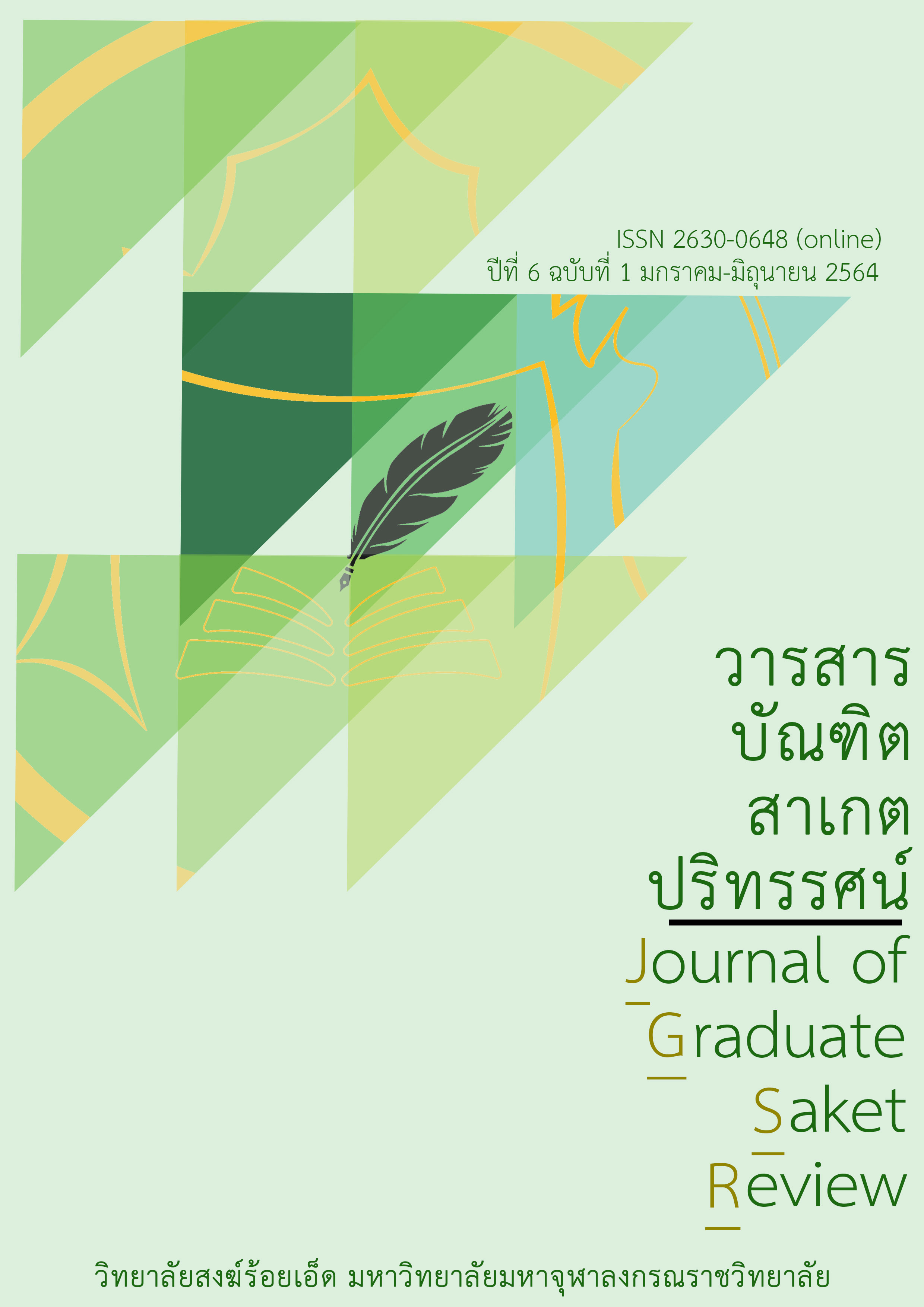Abortion from a Buddhist Ethics Perspective Roi Et Primary Education Service Office 1
Main Article Content
Abstract
Life or existence is an essential value of all human beings. Most of those who are religious or trained in religion believe that human beings should not destroy one's life. For all people and animals love themselves, love happiness, hate suffering, fear death. Therefore, it should not destroy the lives of others because the destruction of life is cruelty pain and suffering Some people think that the mother's life should be preserved because I understand the feelings of women who have been raped and have unwanted pregnancy and to prevent the poor quality of life of the embryos that will develop into humans in the future, for example, if left to be born, will be disabled Therefore, it is imperative to destroy the fetus even when it occurs in distress. Buddhism shows five elements of killing that are considered to be successful: (1) what is to be killed is alive, is breathing. (animals and humans) (2) knowing that it is alive (3) having the intent to kill (4) attempting to kill (5) the being that dies by that effort The best solution to abortion is to address the root cause by cultivating the consciousness of having sex while not ready which causes unwanted pregnancy If beyond this point, it is necessary to judge and solve the problem at the end of the cause which is more difficult to decide and do If the destruction of the embryo occurs for any reason, Buddhism is considered a violation of the precepts. The penalty will be more or less depending on the power of the intent.
Article Details
เนื้อหาและข้อมูลในบทความที่ลงตีพิมพ์ในวารสารบัณฑิตสาเกตปริทรรศน์ ถือเป็นข้อคิดเห็นและความรับผิดชอบของผู้เขียนบทความโดยตรงซึ่งกองบรรณาธิการวารสาร ไม่จำเป็นต้องเห็นด้วย หรือร่วมรับผิดชอบใด ๆบทความ ข้อมูล เนื้อหา รูปภาพ ฯลฯ ที่ได้รับการตีพิมพ์ในวารสารบัณฑิตสาเกตปริทรรศน์ ถือเป็นลิขสิทธิ์ของวารสารบัณฑิตสาเกตปริทรรศน์ หากบุคคลหรือหน่วยงานใดต้องการนำทั้งหมดหรือส่วนหนึ่งส่วนใดไปเผยแพร่ต่อหรือเพื่อกระทำการใด ๆ จะต้องได้รับอนุญาตเป็นลายลักอักษรจากวารสารบัณฑิตสาเกตปริทรรศน์ ก่อนเท่านั้น
References
พระเทพเวที (ป.อ. ปยุตฺโต). (2536). การทำแท้งตัดสินใจอย่างไร: ชีวิตเริ่มต้นเมื่อไร การทำแท้งในทัศนะของพระพุทธศาสนา. กรุงเทพมหานคร: มูลนิธิพุทธธรรม.
วิฑูรย์ อึ้งประพันธ์. (2537). กฎหมายการทําแท้ง: ข้อโต้แย้งที่ยังไม่ยุติ. กรุงเทพมหานคร: เจนเดอร์ เพรส.
สภาประชากร. (2524). การทําแท้งในประเทศไทย: วรรณกรรมปริทัศน์. กรุงเทพมหานคร: โพสต์ พับลิชชิ่ง จํากัด.
สมภาร พรมทา. (2535). พุทธศาสนากับปัญหาจริยศาสตร์. กรุงเทพมหานคร: สํานักพิมพ์พุทธชาด.
สุวัฒน์ จันทรจํานง. (2525). การทําแท้งกับปัญหาการแพทย์และสังคม. กรุงเทพมหานคร: รุ่งเรืองสาส์นการพิมพ์.
วิลาสินี พนานครทรัพย์. (2554). การทำแท้ง: มุมมองที่แตกต่าง. วารสารสังคมวิทยามานุษยวิทยา, ปีที่ 30 ฉบับที่ 1 (มกราคม-มิถุนายน, 2564) : 100.
พระสมุทร ถาวรธมฺโม. (2539). การศึกษาเปรียบเทียบปัญหาจริยธรรมเรื่องการทำแท้ง: ทัศนะพุทธปรัชญาเถรวาทกับกฎหมายการทำแท้ง. ปริญญาพุทธศาสตรมหาบัณฑิต สาขาวิชาปรัชญา. บัณฑิตวิทยาลัย: มหาวิทยาลัยมหาจุฬาลงกรณราชวิทยาลัย.
พระสุรินทร์ อินฺทวํโส. (2555). การทำแท้งในสังคมไทย: ปัญหาและทางออกตามทัศนะของพระพุทธศาสนา. ปริญญาพุทธศาสตรมหาบัณฑิต สาขาวิชาพระพุทธศาสนา. บัณฑิตวิทยาลัย: มหาวิทยาลัยมหาจุฬาลงกรณราชวิทยาลัย.
Frohock, Fred M. (1983). Abortion: A Case Study in Law and Morals. Westport: Greenwood Press.


